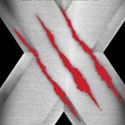
The Unauthorized X-Men
by Len Wein (Editor)
Smartpop/BenBella

The Unauthorized X-Men is not written for the casual fanboy. It’s not a casual stroll through the X-Men universe. IF you’re new to the X-Men world, there are better places to get your bearings. This book is a lot closer to a session at a Popular Culture Association meeting where academics and graduate students pick apart the X-Men world for hidden meanings, allegorical meanings, alternative meanings and projected implications. Of course the authors don’t all agree with each other and there is some sniping across chapters. I think this is incredibly fun stuff!
The X-Men are so popular because the characters resonate with people’s lives. The X-Men is basically about misfits trying to fit in to a society that doesn’t doesn’t trust them. What kind of misfits are the X-Men? That depends on how you look at the X-Men universe. For comic writer Joe Casey, the X-Men are all about teenage alienation. After all, what teenager doesn’t feel like a mutant at some point in their lives? Robert Skir sees the X-Men more as an allegory for the struggle with racial prejudice, with Professor Xavier playing Martin Luther King to Magnito’s Malcolm X. Adam Roberts, on the other hand, reads the X-Men tales as a modern continuation of Ovid’s Metamorphosis; an ongoing retelling of our cultural myths. The fun thing is, no one is wrong. You really can see the X-Men storied in these ways.
The X-Men resonate with readers in another fundamental way. More than any other comic series, the X-Men are rooted in the real world. Professor Xavier and his mutants are based at a school. While most of the main characters have graduated, they still use the school as their base and serve as mentors to younger mutants.
The bad guys are rooted in the real world too. Magneto, the signature X-Men villain, is a Holocaust survivor. His drive to protect mutants by dominating non-mutants is based on his firsthand experience. He knows just how far some normal people will go to deal with folks who aren’t like them. Marie Catherine Caillava examines Magneto storylines for parallels with pre-World War II Zionist ambitions. For example, the Zionists strove for the creation of a Jewish state of Israel while Magneto stove to create a mutant state of Genosha.
This all might be a little bit heavy for some fans who just want to be entertained. If you like seeing how your favorite mutants can be deconstructed and reinterpreted, well then this book is almost as fun as reading the comics or watching the movies. I’m an over-educated geek, so I thought this was a great read.












